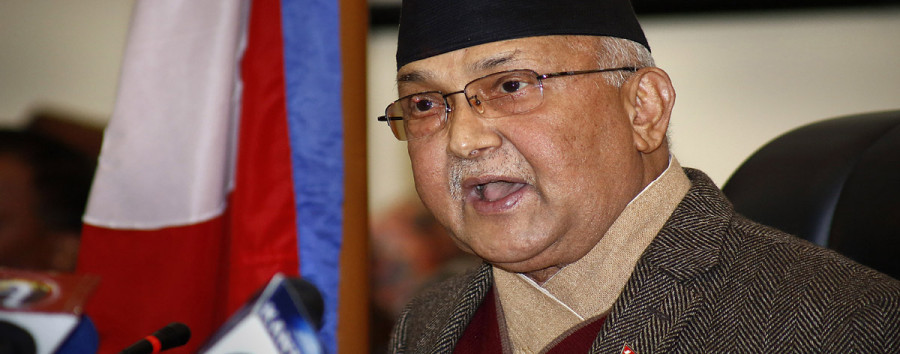Valley
‘Blockade cruel, inhumane’
Prime Minister KP Sharma Oli stated on Sunday that the country, already reeling from the effects of the devastating earthquake, was on the verge of a humanitarian crisis due to a blockade imposed by India
Binod Ghimire
Prime Minister KP Sharma Oli stated on Sunday that the country, already reeling from the effects of the devastating earthquake, was on the verge of a humanitarian crisis due to a blockade imposed by India. This is the first time the prime minister formally described the restrictions on the border as blockade.
In a nearly 40-minute long address to the nation, his first since taking office on October 11, Oli offered no specifics on resolving the current dual crises: agitation in Tarai and the humanitarian crisis due to the blockade. Postponed once before Tihar, Oli’s speech had been widely anticipated for cues, if not specifics, for the government’s approach to dealing with the crises.
Scattered throughout the speech, Oli’s address touched on four areas: Madhesi agitation; blockade, humanitarian crisis and India; relations with China; and short-term and long-term measures to reduce external dependence.
He also made repeated references to ‘national independence and sovereignty, consensus and cooperation’, indicating how he perceives the crises.
Madhes agitation
While offering his commitment to find a solution through dialogue, Oli cautioned the agitating Madhes-based parties about the implications of involving external forces in the internal dispute and the price the country will have to pay eventually.
“Constitution can be amended and even provincial boundaries can change, provided there is consensus on the issue,” said Oli.
The prime minister also sought to counter the narrative on the constitution by challenging those who describe it as “exclusionary”.
“To accuse the constitution of excluding a particular community is either a result of not reading it in its entirety or its deliberate misinterpretation for political expediency.”
Defending the constitution as one of the best in the democratic world, Oli said it ensures equal rights for all Nepalis regardless of their gender, ethnicity and region.
Recognising that the historically marginalised communities need a level playing field, the constitution has special provisions to ensure proportional representation and social justice, Oli said.
Highlighting that the government had already met preconditions of the agitating parties by starting the process of releasing Rs1 million in compensation to the families of the dead protesters, free treatment for those injured and withdrawal of cases against the protesters barring those involved in serious crimes, Oli called on the Madhesi parties to reciprocate and end public suffering. He repeatedly urged the leadership of the Madhes-based parties to reflect on the adverse effects of their protest and the tactics being used by protesters.
On India
Prime Minister Oli did not hesitate to describe the blockade as “cruel, inhumane and beyond imagination”. Expressing his dismay at the behaviour of Nepal’s closest friend, he said New Delhi’s response was unacceptable even at war.
“The crisis that has been imposed on us is unacceptable even in times of war. People who have an iota of human sensitivity have to reject this blockade for what it truly is,” said the PM, adding that Nepal’s right as a sovereign country, and multiple international charters had been violated in denying Nepal free transit.
He accused the Indian Oil Corporation of flouting even the basic commercial principle by not providing fuel paid for in advance.
Expressing his concern over the deteriorating bilateral relations, Oli urged the Indian government to reflect on how their actions will shape the perceptions of the younger generation in Nepal. Stressing that Nepal was willing to play its part to improve the ties, he urged India to meet him halfway. Prime Minister Oli spoke at length about the humanitarian crisis caused by the blockade-describing its impact as more hurtful than the earthquakes.
“The earthquake was projected to push over 500,000 people below the poverty line. This blockade is likely to have a more adverse effect,” Oli said. The prime minister also spoke of Nepal’s desire to build relations with India on the basis of mutual respect and without infringement of Nepal’s right of free transit.
“Countries may be big and small but sovereignty is not big or small,” he said.
On China
Prime Minister Oli thanked the government of China for immediately responding to Nepal’s request by providing shipments of fuel in grant. He said the government would prioritise trade expansion with China and upgrade the road connectivity. Perhaps mindful of the implications of his message, Oli immediately sought to clarify that improving ties with China was
not aimed against any particular country. He said diversifying trade was in Nepal’s own interest—to balance trade and to reduce external dependence.
Reducing dependence
Prime Minister Oli stressed on the importance of learning lessons from the current crisis and using it as an opportunity. This crisis has clearly showed that we have extreme external dependence, and heavy reliance on few border points, he said. The PM gave a long list of short-term and long-term programmes his government would implement including diversifying energy consumption, generating more renewable power, including 200 megawatt of solar energy in a year, and shifting urban mass transit towards electricity-powered vehicles.
The takeaways
- Reiterates willingness to resolve discontent through dialogue
- Accuses deliberate misrepresentation of the contents of the constitution
- Warns against cost of involving external forces in internal dispute
- Offers a long list of programmes to reduce external dependence
- Thanks China, vents ire at India




 16.12°C Kathmandu
16.12°C Kathmandu













